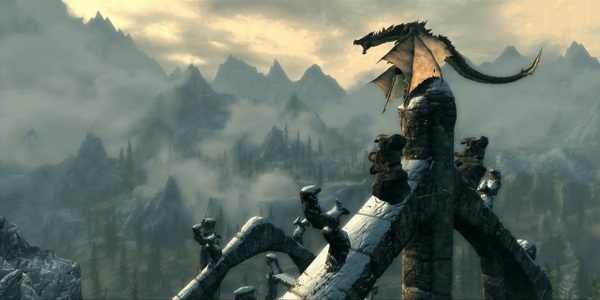
Dragonborn to be wild.
Some people think video game reviews should read like you’re evaluating a fridge: a checklist of functions, a section on caveats, a pile of clichés, a numeric conclusion. For these writers, the non-linear adventure is a nightmare: you could spend hundreds of hours playing and never see everything. How can you then claim you’re qualified to judge it?
But games are not appliances, they are experiences: everyone’s opinion is valid. The review tells you as much about the writer as the game, and so you compare the reviewer’s interests to your own to determine whether the game is right for you.
The only similarity between a fridge and Skyrim is the climate. Its Arctic wastes ensure no fruit will ever grow mould, no milk will ever sour. Exploring the beautiful, lonely north coast of Tamriel reminds me of hiking through the mountains of Donegal or the Scottish Highlands, but here there is no pre-determined route: the province is yours to explore. After a brief introduction where you’re saved from execution by a dragon ransacking the village, you’re left to your own devices. The map is initially marked with excitingly-named cities like Winterhold, Solitude and Falkreath, but apart from those markers the world is an untamed wilderness.
Your character is clay in the player’s hands, waiting to be moulded into a barbarian, mage or thief; a sneaky barbarian, a magic thief, or a lizard wizard, and so on. The combinations are endless and you’re never bound by your decisions: like previous Elder Scrolls games, the more you utilise a skill the more powerful it becomes. If you find yourself in need of archery skills, you can go and hunt some wolves with your bow or pay a trainer to impart their wisdom upon you. Luckily some of these skills have been removed from Oblivion and you don’t have to stand in a field jumping all day to improve your ‘jumping skill’.
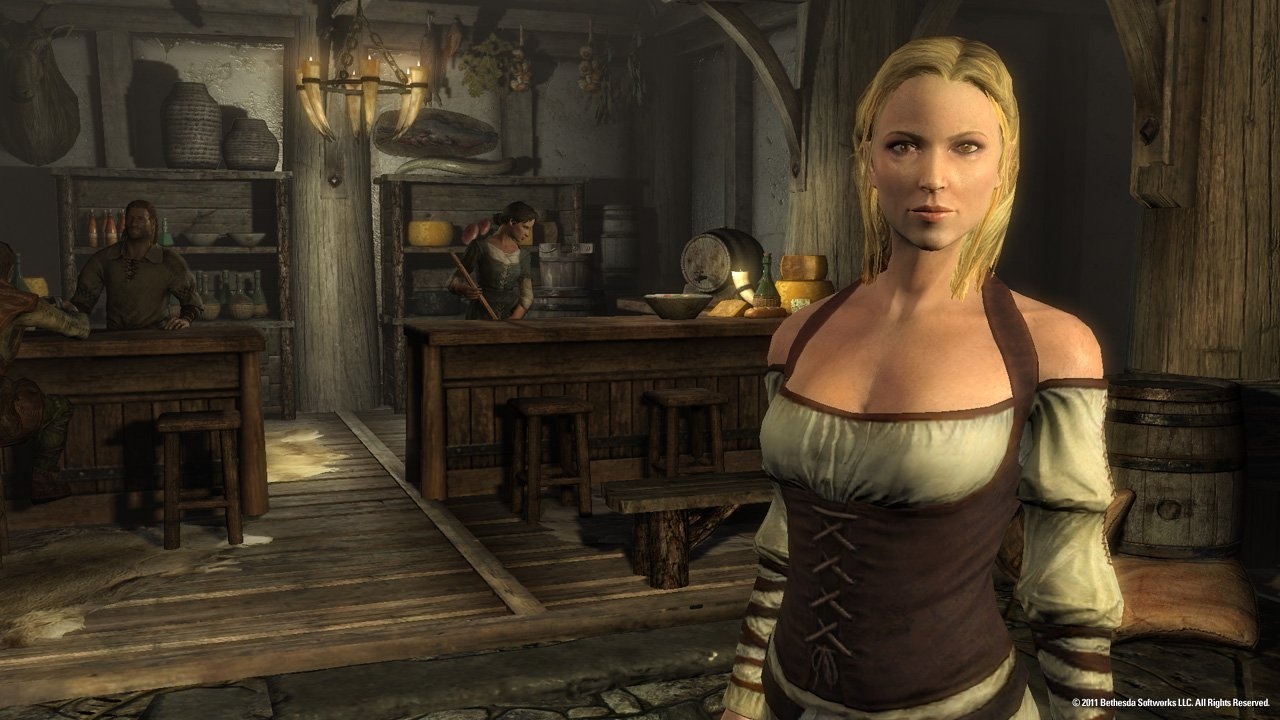
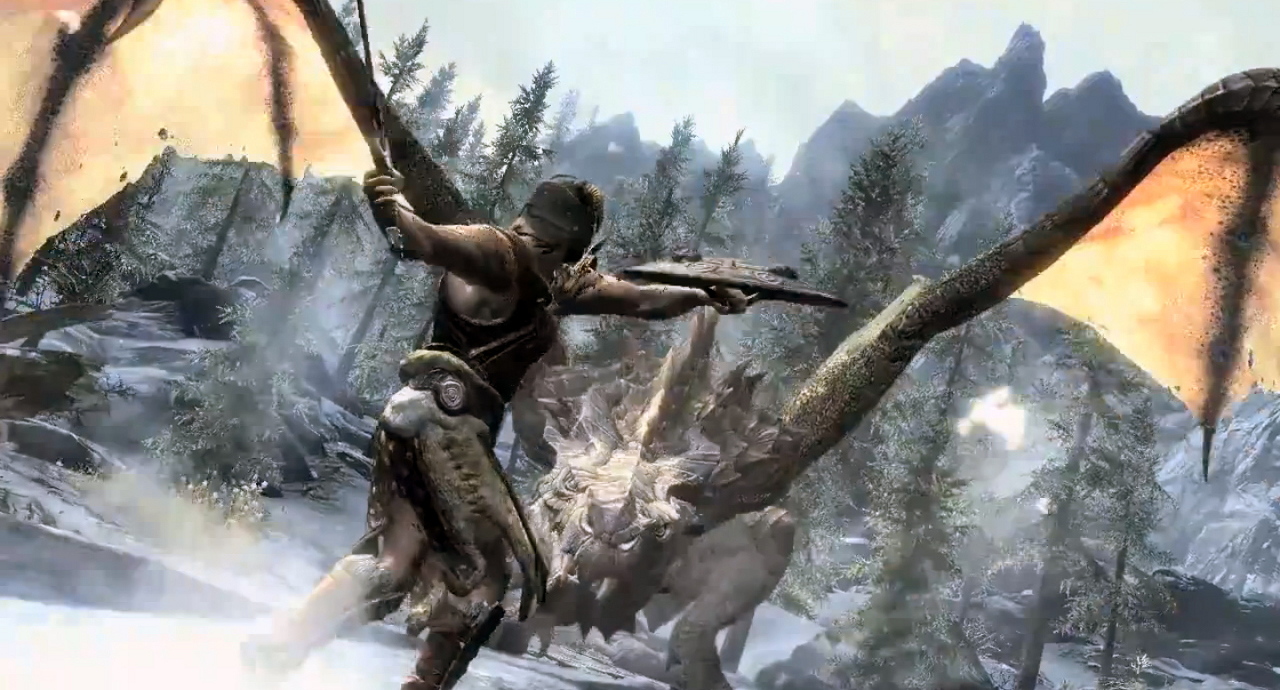
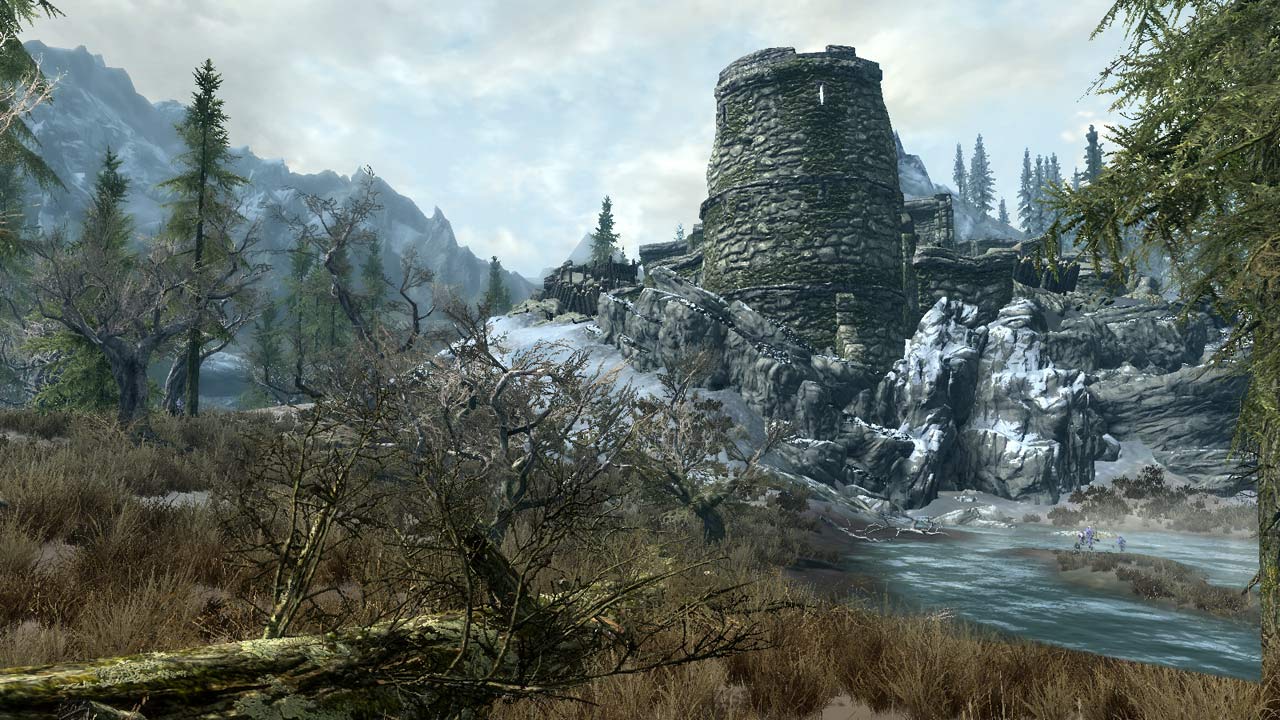
You can do whatever tickles your fancy without being punished: there is a main quest to follow where you discover your destiny as last of the Dragonborn, but the story is frozen until you choose to defrost it. Seemingly every conversation adds a new location to explore: caves inhabited by vampires, a bandit fortress, rumours of a dragon on a snowy peak. There are so many objectives being tossed in your direction that you’ll never finish them all: halfway on a trip to Falkreath, I was sent off to The Rift to join the Thieves’ Guild instead. I have yet to visit Falkreath.
The best stories in Skyrim are the ones you make for yourself: catching sight of a dragon and spending an hour climbing just to slay it, finding a camp of orcs and seeking their approval, picking a fight with a mysterious giant and being pulped in a single hit. You can pick any direction, start walking and are guaranteed to find a point of interest. Unlike the Oblivion, the ruins and caves weren’t all mass produced in the same dungeon factory, and there’s always a worthwhile trinket at the end of them.
Skyrim is, in many ways, the game that Oblivion should have been. Combat feels more dangerous and less mathematically determined: enemies can unleash power attacks that will kill you in a single hit, so you’ll have to think tactically and drain their stamina from a distance. You’ll never be caught dead in just your underwear as armour doesn’t ‘break’ in Skyrim, but it can be enhanced if you choose to learn smithing. The difficulty is more well-judged than Oblivion, where characters quickly became unstoppable gods whose enemies crumbled at the mere flick of an eyelash. Although your powers increase as you progress, you’re never invincible.
One area where Skyrim is a step back from Oblivion is the terrible user interface: the inventory is an endless list that takes up a tiny sliver of the screen, with more attention paid to high-resolution models of your items than their actual effects. The skills menu appears to be a beautiful arrangement of constellations at first, proving ultimately useless as you try to compare various perks across skill trees. It’s not so bad as to be unbearable, but it’s not much fun juggling menu selections when you should be juggling fireballs and your enemies’ skulls.
The biggest new addition to Skyrim are the dragons, whose existence is entangled with your own. Their resurrection provides the focus of your quest, their souls are harvested to learn new special powers or ‘shouts’. Sometimes you’ll be on a leisurely stroll back to Whiterun for some shopping and a quick pint when a scaled beast will roar out of the fog and spew flames at you. Although initially thrilling, the dragon battles are actually one of Skyrim‘s weaker moments, as they grow repetitive over time. Melee fighters are at a particular disadvantage, since dragons are rather famous for their flying. Without the ability to shoot their wings off, the fight is somewhat protracted. Dragons lend the game personality, but their own personalities are very similar: often confused, always aggressive, sometimes flying backwards as a result of one of the many bugs in the code.
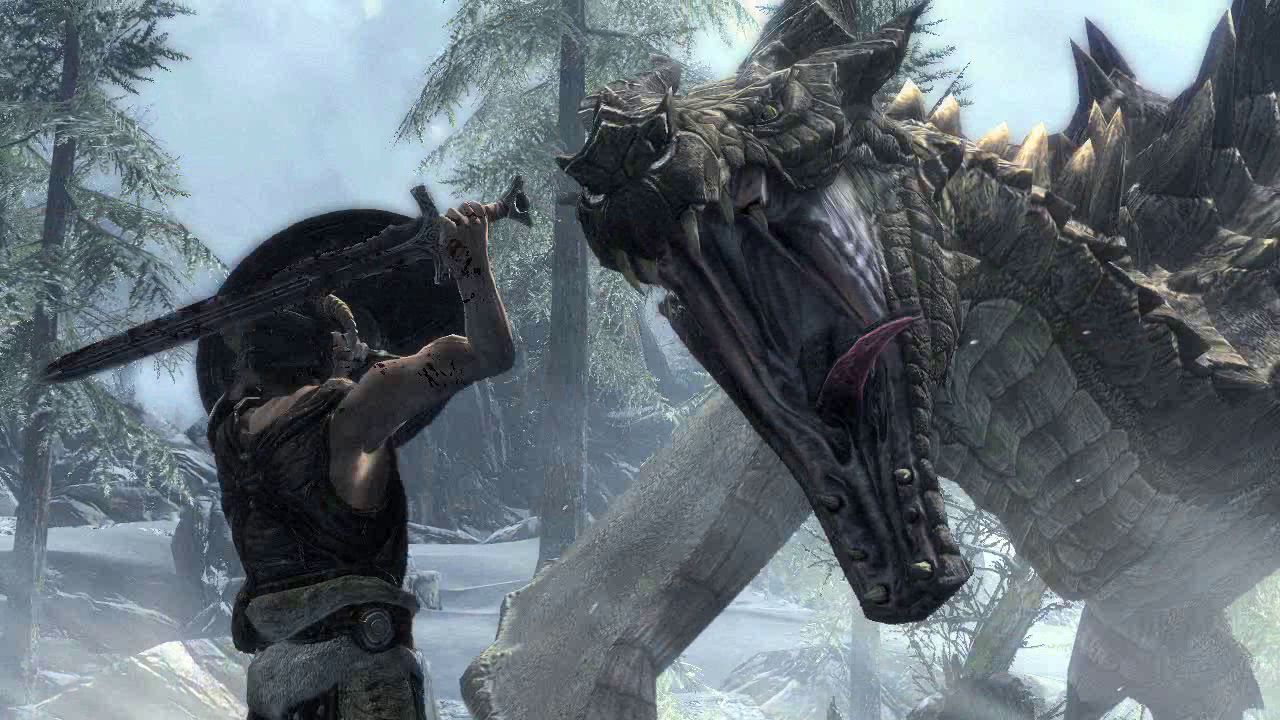
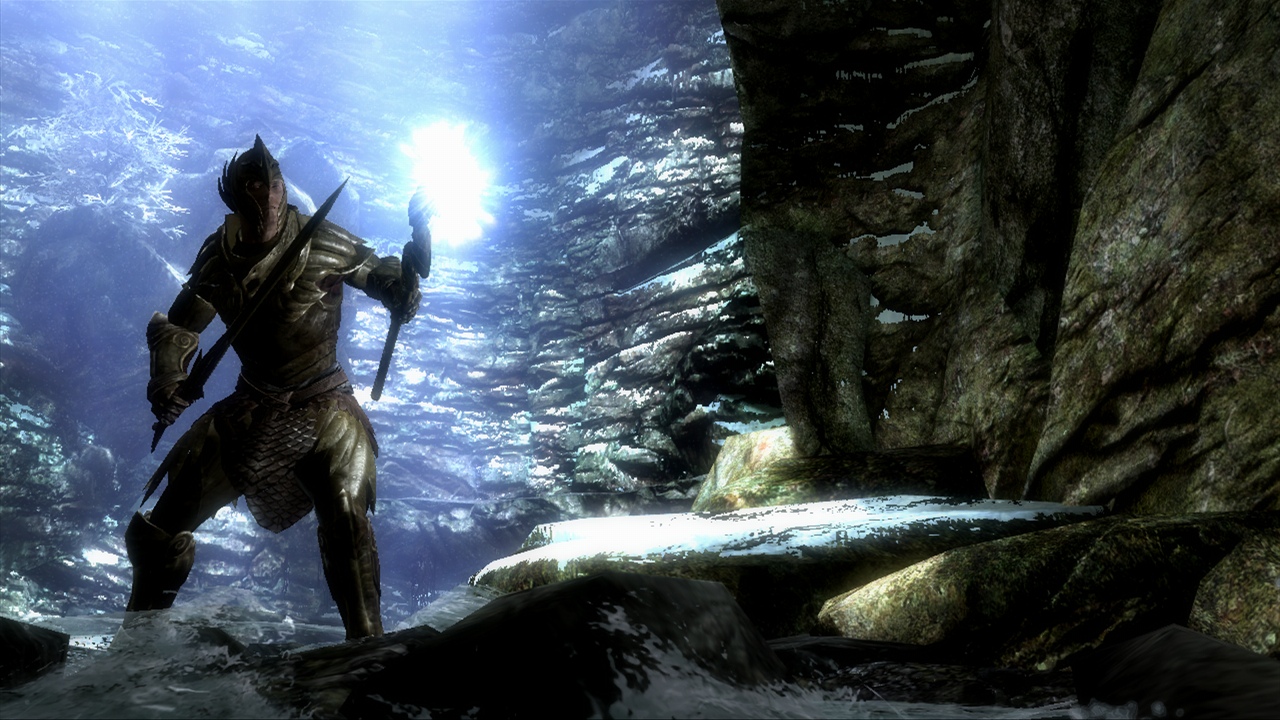
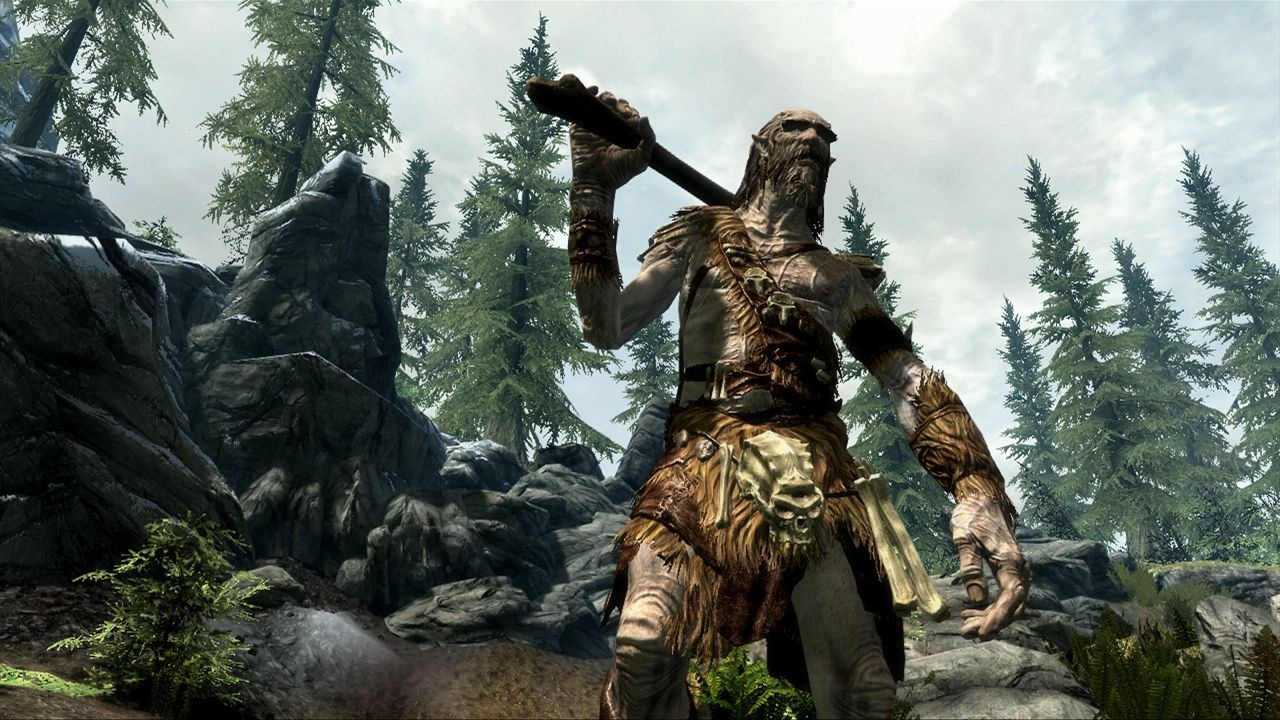
Many problems have already been patched, but even after two months of game updates it is perilously buggy. I don’t agree that this lends Skyrim ‘personality’ as others have remarked, which is like saying your personality would be enhanced if someone poked you in the eye. Sometimes your horse will defy gravity as it runs up a mountain, or you’ll be able to steal items from a shop with impunity. In combat with multiple dragons, the game will freeze faster than a Winterhold hydrant. The bottom line is that these issues tarnish the experience, and I hope they are fixed sooner rather than never (as was the case with Oblivion).
Yet it is better to be brilliant and flawed than dull and perfect. For every enemy stuck in a wall, there are ten that randomly ambush you while riding through the countryside. I used to be annoyed with every stupid line of repeated dialogue, but then I took an arrow to the knee… and was glad that every character could speak their mind. One patch completely broke magic resistances, which was a blow when your character relies on magic to prevent death. I hunted down an earlier revision of the patch and copied it to a memory stick just to continue playing the game: something I wouldn’t even have considered doing with any other title. Taken in a wider context of what this game achieves, its flaws become tolerable. It’s a sick baby dragon you want to nurse back to health, but that’s hard if the poor thing burps fire into your face when you’re trying to help.
What does it mean to be ‘free’ in a game? You’re free to do whatever the developer has decided: free to ride on horseback to the invisible walls surrounding the game world, free to kill characters who aren’t critical to the plot, free to enter this building- but not that building, that’s just a door texture sprayed on a wall. Skyrim has its limits, but it’s rare that you will actually encounter them. That’s what makes it jarring when a soldier gets ‘knocked unconscious’ or a peak can’t be scaled, because the freedom to explore and develop your character is unrivalled. You can, as I’ve done, play for thirty hours without visiting two of the major cities. You can retire to the mountains and spend all day making weapons at a forge, or live off the land and be a hunter. Whichever path you choose, your time never feels wasted, but completionists may be driven insane by Skyrim‘s ever-expanding wealth of content.
The truth is that no game this year- perhaps no game ever made- has this much scope, depth or romantic adventure. Woodcutter, warrior or wizard: your journey is truly epic, extraordinary and unique. While Bethesda have not made a perfect game (and in some aspects, a finished game), if this is the price we pay to be so enthralled, then I’m just glad they tried.






